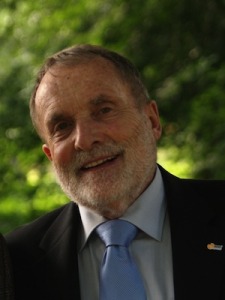At the 2019 International Supercomputing Conference (ISC) in Frankfurt this week, the ISC committee awarded the event’s top prizes for outstanding research papers — the Hans Meuer Award and the Guass Award. Submitted papers are reviewed by the ISC 2019 research papers committee, which is headed by Dr.-Ing. Carsten Trinitis, TU Munich, as chair, and Saday Sadayappan, Ohio State University, as deputy chair as well as Dr. Michèle Weiland, EPCC, as proceedings chair and Guido Juckeland, Helmholtz-Zentrum Dresden-Rossendorf, as proceedings deputy chair.
The Hans Meuer Award

The Hans Meuer Award honors the most outstanding research paper submitted to the conference. It was introduced in 2015 in memory of Dr. Hans Meuer, co-founder of the Top500 project and ISC’s general chair from its inception in 1986 until Meuer passed away in 2014. The winner of the Hans Meuer Award receives a cash prize of €5,000, an award certificate, a free pass to next year’s ISC and the opportunity to present a keynote on their work.
The Hans Meuer Award finalists
ISC 2019’s Research Papers Committee selected 17 papers for presentations at this year’s conference. In April, they narrowed that list down to two finalist teams for the Hans Meuer Award. In ISC 2019’s first Hans Meuer Award session on Monday, the two finalist teams presented on their research papers back-to-back in advance of the following day’s award ceremony.
First to the stage were Ignacio Laguna of LLNL, along with Paul C. Wood, Ranvijay Singh and Saurabh Bagchi — all with Purdue University — to discuss “GPUMixer: Performance-Driven Floating-Point Tuning for GPU Scientific Applications.” The authors outlined how the tool they designed – which they called “GPUMixer” – conducted mixed-precision floating-point tuning on scientific GPU applications. In contrast to other precision tuning techniques – which, the authors stressed, are designed for serial programs and are accuracy-driven at the cost of performance – GPUMixer is, instead, driven by performance and employs multiple threads. Using GPUMixer, they were able to demonstrate massive performance improvements – up to 46.4 percent of the “ideal speedup,” compared to 20.7 percent from other state-of-the-art methods.
The stage then went to the other finalist team – Joseph Schuchart and José Gracia from Universität Stuttgart. Schuchart and Gracia discussed their approach to managing global task data dependencies in partitioned global address space (PGAS) applications. In their research, they used fine-grained task synchronization across process boundaries to counteract the absence of fine-grained synchronization communication in the PGAS model. Citing rigorous evaluation using the Blocked Cholesky Factorization and the LULESH proxy app, Schuchart and Gracia demonstrated the feasibility and scalability of their approach.
With the finalists’ presentations complete, the research papers committee retreated to deliberate and make its final decision. For a day, at least, the pressure was off the finalists – but the suspense was on.
The Hans Meuer Award ceremony

The next day, Dr. Yutong Lu (ISC 2019 program chair) and Dr. Carsten Trinitis (ISC 2019 research papers chair) took to the stage to announce the results. After much fanfare – and to the tune of Europe’s “The Final Countdown” – the 2019 Hans Meuer Award was given to Laguna, Wood, Singh and Bagchi for their work on GPUMixer. Laguna – the lead author of the winning paper – accepted the award on behalf of the research team.

“This award means a lot to us,” said Laguna. “Dr. Meuer was the general chair of the ISC conference for many years and one of the co-founders of the Top500 project. This is an absolute honor for us. Thank you very much for this award, and thank you very much to the ISC conference for this award.”
During the ceremony, Trinitis also invited the team from the second-place paper on stage, where Schuchart represented his team.
The GCS Award
 The GCS Award — which is sponsored by the German Gauss Centre for Supercomputing (GCS) — has been awarded to the most outstanding research paper submitted to the conference in the field of HPC since GCS’s foundation in 2007. The winner of the GCS Award receives a cash prize of €5,000, an award certificate and the opportunity to present a keynote on their work.
The GCS Award — which is sponsored by the German Gauss Centre for Supercomputing (GCS) — has been awarded to the most outstanding research paper submitted to the conference in the field of HPC since GCS’s foundation in 2007. The winner of the GCS Award receives a cash prize of €5,000, an award certificate and the opportunity to present a keynote on their work.
The GCS Award winner
This year, the GCS Award was given to “End-to-End Resilience for HPC Applications” by Arash Rezaei, Harsh Khetawat, Onkar Patil, and Frank Mueller (with North Carolina State University) along with Paul Hargrove and Eric Roman (of Lawrence Berkeley National Laboratory). While the winner of the award was announced ahead of the conference, ISC 2019 celebrated the researchers in its opening session and hosted their keynote presentation.
Presenting just after the Hans Meuer Award finalists on Monday, the authors detailed their vision of end-to-end resilience for HPC applications, which they sought to enable by protecting “windows of vulnerability” between kernels that employ incongruous resilience techniques — all while necessitating minimal programming effort. The researchers detailed how they hope their work will allow application programmers to focus entirely on algorithms and performance.




























































